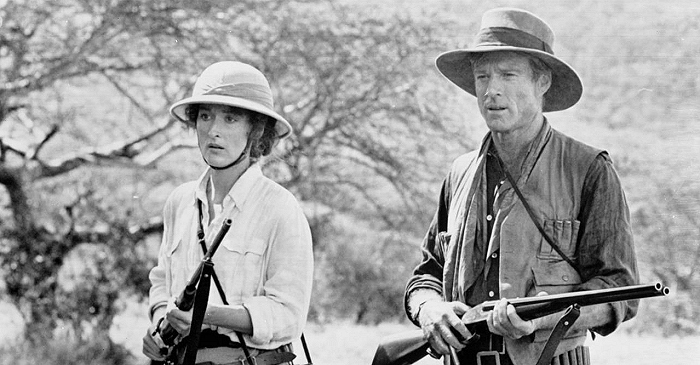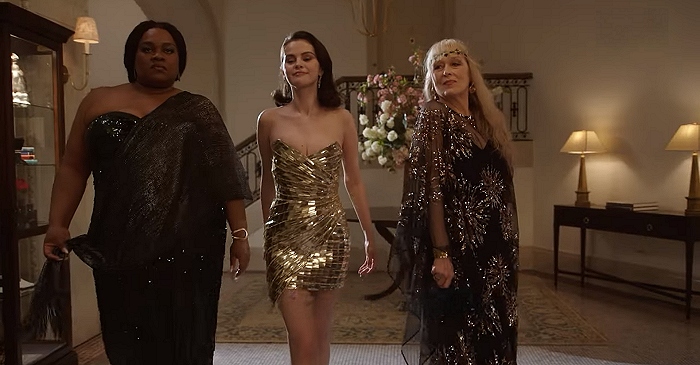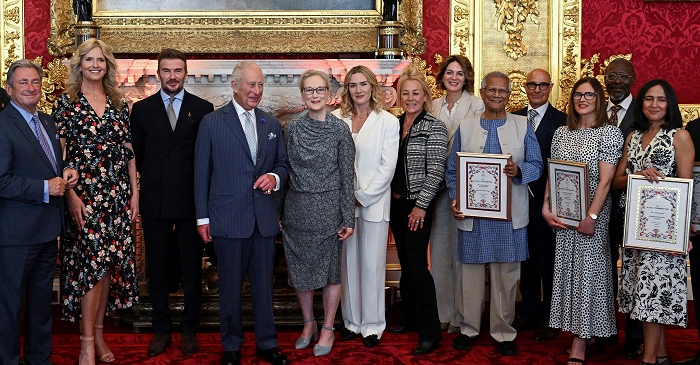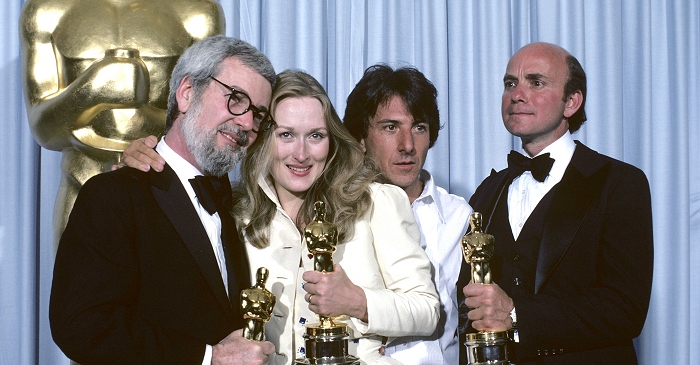|
Simply Streep is your premiere online resource on Meryl Streep's work on film, television and in the theatre - a career that has won her acclaim to be one of the world's greatest living actresses. Created in 1999, Simply Streep has built an extensive collection over the past 25 years to discover Miss Streep's body of work through thousands of photographs, articles and video clips. Enjoy your stay and check back soon.
|
|
Streep's Ahead
Interview Magazine ·
December 1998
· Written by Graham Fuller
| ||
It was around 1980 that Meryl Streep was first hailed as America’s greatest living actress. And who can dispute that, for what little it’s worth, she remains in that Olympian position? Ten Oscar nominations – with wins for Kramer vs. Kramer (1979) and Sophie’s Choice (1982), hardly her best work in retrospect – is no fluke for a woman who had conquered the New York stage by her mid twenties. No one else has demonstrated such emotional range or such a facility with different accents, demeanors, social classes, and looks. Her greatest achievement may be that virtually every time out she makes Meryl Streep disappear.
But Streep has her critics and they’ve raised pertinent questions about her choices: Why the ill-starred resort to comedies of dubious merit in the late ’80s and early ’90s? Why The River Wild (1994)? Why, above all, her abandonment of theater? In the following interview, Streep claims the constraints of motherhood have determined her path: She has three daughters and a son, none of them yet twenty. And to her credit she doesn’t blame that old chestnut “the lack of good roles for women” for what she has decided to do. While it’s fair to say the mid ’90s have been lean years for her, she was outstanding in both The Bridges of Madison County (1995) and Marvin’s Room (1996), as well as this fall’s One True Thing, in which she made maternalism and domestication saintly. She’s better still as the pinched Irish schoolteacher who dominates her unruly sisters (Brid Brennan, Kathy Burke, Sophie Thompson, Catherine McCormack) in ’30s Donegal in the film of Brian Friel’s elegiac play Dancing at Lughnasa: It’ll probably bring her nomination number eleven.
When I met Meryl Streep in a Greenwich Village restaurant her hair was tied back and she was wearing a billowy white blouse. At forty-nine, she is beautiful – much more so than she allows herself to appear onscreen. She seemed serene but admitted to feeling nervous about her scheduled appearance on The Tonight Show two days later. “I’m all over the place,” she said. How touching is that?
GRAHAM FULLER: Was it a burden to you when, early on in your career, you were heralded as a great actress?
MERYL STREEP: It’s lovely when people say nice things – certainly better than being called a complete ignoramus – yet it can be an obstruction in my work. It comes into the room like a big gorilla before I arrive, and then I have to escort him out and introduce myself because there can be nothing like that between actors when they work together. All an actor has is their blind faith that they are who they say they are today, in any scene. When I started on Dancing at Lughnasa, I realized the gorilla had definitely preceded me in, and I wasn’t sure the other actresses would accept me. But those girls really let me off the hook because they’re not impressed with, well, anything.
GF: What drew you to play Kate in that film?
MS: Well, I’ve wanted to go back to the theater for a long time but I can’t because I’d be gone all night and every weekend, which is when my children are home; so I’ve had to give it up. But Dancing at Lughnasa was an opportunity to work in a theatrical ensemble, on a film based on a beautifully written play about something fundamentally truthful. As far as Kate goes, she’s all about suppressing emotion with every bone in her body – she’s Mother Courage, keeping it all together – whereas my job is usually to express emotion as freely as possible.
GF: She and her sisters are laboring under intense sexual repression, aren’t they?
MS: It’s sexual and spiritual repression. Even though everything’s ruled by the church, the spirit isn’t allowed to sing. It’s all tied up in these convoluted rules. And that is a metaphor: We all have to control ourselves and bind ourselves up in the rules of living and appropriate behavior.
GF: But these women have gone too far with the self-control –
MS: – and they don’t have a chance. But to glimpse the beauty of their souls in such stark circumstances is just gorgeous.
GF: We see how much Kate has stifled herself when she talks to the grocer in his shop. She’s attracted to him but she can’t express it.
MS: You get a glimpse of her as a girl suddenly in that scene, and it’s so sad because she’s never going to have a relationship with a man.
GF: She gets to experience one wild sisterly moment in the film –
MS: Yes, the dance. They’re like dervishes – getting free, you know.
GF: But it’s just a moment. They can’t sustain their life together. Do you see it as a tragedy?
MS: No. I feel like it’s the truth; it’s like life to me. I have a very good life – I’m lucky enough not to be deprived – but the movie feels accurate. There’s sadness in life and a richness, too. These sisters have both; they have a lot. And the story is a love letter to these women from the youngest sister’s son: Looking back, he understands something had changed that summer and he couldn’t stay in that community and make the sacrifices his mother and aunts made to be with each other. But as he looks back he’s thanking them for what they gave him – the ability to leave with a full heart and greater wisdom about people and what matters in life.
GF: Similarly, One True Thing is a far from depressing film, even though you play a woman – also named Kate – who’s dying of cancer.
MS: I’m so glad to hear you say that. Call me crazy, but I feel there’s an odd elation in the film, and that there’s very good news at the end – which is that your life matters and sometimes children listen and the lessons go in.
GF: The big irony, of course, is that your character is the least tragic of them all.
MS: Yes. What was amazing about Anna Quindlen’s novel was that it noticed the mother. A whole generation has been brought up on Death of a Salesman, with all the attention paid to Willy Loman. Nobody ever pays attention to Mrs. Loman!
GF: The husband in One True Thing [played by William Hurt in the film] takes refuge in his academic career and the novel he’s never going to get published – it’s as if life and death are too much for him to deal with. Do you think men, in general, have a tendency to bury themselves in stuff that’s disconnected from reality whereas women, the childbearers, are more tuned in?
MS: I do think men can be more easily diverted from what really does matter, from what’s going to be important to them when they look back. They’re able to take a compensatory glory in the world when their name is written large in other ways. Mothers don’t have that. Something is ceded on both sides, and I think women understand this and what their role is, probably out of necessity. Anna and I are of the generation of women that was seduced into the pursuit of outward achievements and success on a different scale than the success of a relationship or the things that are unmeasurable, like raising a child well or doing a good job at home. Anna really wrote this book about her mother and her generation – women who, when their husbands came back from the war, quit their jobs and stayed home. Their expectation was not that they would have a career but that the world would extend only as far as their communities and their families. But they raised daughters who expected to make a mark on the wider world and use their education for something more than running their house.
GF: Was the One True Thing shoot tough on you?
MS: No. I was happy going to work every day. I loved playing Kate because she’s not a neurotic woman. Also the teamsters loved me and I was pretty – I had my hair curled.
GF: It wasn’t hard playing a dying woman?
MS: It wasn’t. Kate is in such denial; she pushes the bad stuff away. And she’s so suffused with love. There was a line in Marvin’s Room I remember: Diane Keaton’s character, who’s also dying, says, “I’ve been so lucky to have had all these people in my life.” And my character, misunderstanding, says: “Yeah, they love you so much.” The woman I play is thinking, Nobody loves me, they all love you. And Diane says, “No, I’m lucky to have loved so deeply.” This is also the wisdom Kate has, which is: Better make a connection before it’s too late.
GF: There was an article in The New York Times a few months back about women who are invested in the idea of being housewives again – but they’re not antifeminist women.
MS: I understand that yearning and yet, having been let out of the barn once, I know I wouldn’t be happy if I were home all the time. I really love my work and being able to vent the stored-up, inchoate frustrations and anxieties and longings and passion, whatever it is that makes people want to express themselves. I really need that.
GF: Was that why you originally became an actor?.
MS: After I graduated from college, I was a sort of hippie in a little company of actors up in Vermont. We’d travel around in a Volkswagen van. I remember thinking, This isn’t good enough. These people are interesting and smart and challenging, but it isn’t rigorous enough, and I need to go where people are more serious about acting. I had never felt that way before. I realized there were things I wanted to work on – I didn’t even know what they were – and I wanted to go where people did it better. So I decided to apply to the Yale drama school. I was broke and they gave me a scholarship – those were the days when people still got those. It was a big moment for me, of course.
GF: Did there come a realization at some point that you were a pretty good actor?
MS: My friends told me I was pretty good. All I felt was that I was free, that I was really happy, somewhere deep, deep inside when I was acting, and transported on some level to a place that was really like being in love.
GF: Do you still feel that?
MS: Yes. Not every day, God knows.
GF: Were you idealistic?
MS: I think I probably still am.
GF: How do you measure your career?
MS: I really don’t because I feel it’s a series of random acts. I came up in the theater where there’s less pressure to find a particular niche, and I’ve always felt my talent is various enough that I can put myself into different situations and have my imagination tripped by many stimulants. My attitude is, Why not try this? So I go from thing to thing like any actor does, with my little bag, my dopp kit. I think of my career as a palette, a mess of colors, and I’ve used them all before. But they’re recombinant – and that’s what enables you to make a new person each time.
GF: It occurs to me that when people follow an actor’s career from film to film they feel they have a grasp on who the real person is, whereas they may actually know very little about them.
MS: The progression of roles you take strings together a portrait of an actor, but, as I’ve said, it’s a completely random process. In other words, which role was available which year has more to do with who was running a studio or who was bankrolling a particular project or who the costar was. Then people who write about films always attempt to find a through line to a career. There is a through line to a life based on the choices you make, and so you can discern some things about an actor. But not necessarily a lot.
GF: Up until the late ’80s, you mostly took serious and often tragic roles in such films as The Deer Hunter [1978], Kramer vs. Kramer, Sophie’s Choice, Silkwood [1983], Out of Africa [1985], and Ironweed [1987]. And then, in quick succession, you did four comedies – She-Devil [1989], Postcards From the Edge [1990], Defending Your life [1991], and Death Becomes Her [1992] – which made us think differently about you. Was there a conscious desire on your part to lighten up?
MS: No. The reason I chose the movies that I did was based on where they were being filmed. My son had gone to preschool in Texas, kindergarten in New York, first grade in Africa, the second part of first grade in England, second grade in Connecticut, third grade in Australia, and fourth grade in Los Angeles. He said, “I don’t want to be new anymore,” so I stopped picking these wild locations and my husband and I decided to stay in Los Angeles. The films I shot there enabled me to go home at night and didn’t compromise my need to say something in my movies. [pauses] I haven’t done too many things I’m ashamed of, or at least of what the attempt was. Death Becomes Her, which is one of the films you referred to, maybe wasn’t entirely successful. But I thought it was a comedy with a very sharp point about how actresses in Los Angeles deal with aging, and I liked it. It wasn’t a blockbuster but I don’t care – it’s still funny.
GF: Do you connect with the person you were when see yourself in the films you were making twenty years ago? Do you know who that woman with the long blonde hair was?
MS: First I think, My God, I always thought I was so fat, [laughs] and I was not fat. And then I think, Oh, I was so young. But I feel like I’m still the same person I was when I was twenty-eight. That’s when I started my [film] career, basically. I don’t run as fast, but inside I don’t feel any different.
GF: I would’ve expected you to say, “Yes, she was a different person.” Because we do change whether we want to or not.
MS: We do? This is a profound difference of opinion that we have here. Do you really think that we do change? Deeply?
GF: I think we have to.
MS: What specifically changes? Your heart and your motivations and your instincts?
GF: I was thinking of one’s ability to negotiate compromises, and to give up on battles you don’t need to win and to win the ones you do.
MS: I think all that’s true. But I think of it more as an evolution, in which your fundamental self remains the same. Being the mother of four, I’ve seen that personality is immediately apparent, from birth, and I don’t think it really changes. Your way through the world does change – your way of making decisions and deciding whether or not to put up with the stuff you’ve put up with for years. Rather than changing, I think your self emerges more clearly over time – and you become less arrogant. I mean, I was a really big expert on acting before I started acting. [laughs] Now I’m much less of an expert.
GF: But when you’re working these days, do you find it easier to get where you’re going each time because of your experience?
MS: Certain things are easier. I don’t have to struggle to imagine emotional experience because I have a richer mine of experiences to draw from than I did when I was younger. I just hadn’t lived as much. But other things are harder, including being sure I’m making the right decision. I’m never so sure as I was in my mid twenties.
GF: Do you ever go back into the consciousnesses you create for your characters?
MS: If I do I’m not aware of it. I’m not an incredibly self-aware person anyway, or at least I’m not self-analytical. Sometimes with my children, when I’m cuddling them or yelling at them or something, I remember exactly how I felt as the child in this situation, not just how it feels to be me. But as for my characters and myself, there’s no division – they’re all me. I never think, Oh, that was Karen Silkwood feeling betrayed and scared and furious when they took all the radioactive stuff out of her house and she discovered she’d been contaminated, because that was me feeling it. I felt a similar sense of betrayal in Dancing at Lughnasa, when the priest takes my teaching job away, along with my self-esteem, my dignity, everything. It’s what in therapy they call acting out. I get to do it and get paid. And that’s very healthy for me because it’s something that does need expression.
GF: So do you think you’ll always want to act?
MS: Yes, I need to do something or else I’d drive my children insane.
GF: What fears do you have?
MS: K’ain Ayin Hara – that’s my feeling about fears. It’s Yiddish for “it shouldn’t happen” – if you voice your fears they may come true. I’m superstitious enough to believe that. What I will say is, once you’re a parent you’re visited by fears you never knew existed in the world, anxieties you never anticipated. You don’t want your children to be broken.
GF: Does that push aside the more personal fears that are all about you?
MS: Oh, those have been pushed aside a long time ago.
GF: All of them?
MS: I don’t know. I hope I don’t hurt anybody. I hope the stock market doesn’t crash. [laughs]










